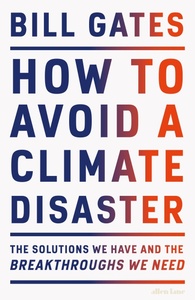Take a photo of a barcode or cover
954 reviews for:
How to Avoid a Climate Disaster: The Solutions We Have and the Breakthroughs We Need
Bill Gates
954 reviews for:
How to Avoid a Climate Disaster: The Solutions We Have and the Breakthroughs We Need
Bill Gates
informative
inspiring
medium-paced
*Simply amazing*
I could write an essay about what a great read this book has been and it still wouldn't do it justice.
Better to keep it short. I'll say it plain and simple, this book is amazing, exactly what we need today to raise awareness regarding the climate.
Even though it is about a serious topic, the book is truly pleasant to read, Bill Gates has managed to captivate the reader's attention and imagination while simultaneously teaching you about the world.
I simply loved this book. This is one of those books which I recommend everyone to read because it makes you a smarter person. To me, that is the best recommendation for a book, a book which after you have read it, makes you a more intelligent/better person.
How to Avoid a Climate Disaster is that book, up there with Hans Rosling's Factfulness.
Definitely my best read of this year.
Recommended!
I could write an essay about what a great read this book has been and it still wouldn't do it justice.
Better to keep it short. I'll say it plain and simple, this book is amazing, exactly what we need today to raise awareness regarding the climate.
Even though it is about a serious topic, the book is truly pleasant to read, Bill Gates has managed to captivate the reader's attention and imagination while simultaneously teaching you about the world.
I simply loved this book. This is one of those books which I recommend everyone to read because it makes you a smarter person. To me, that is the best recommendation for a book, a book which after you have read it, makes you a more intelligent/better person.
How to Avoid a Climate Disaster is that book, up there with Hans Rosling's Factfulness.
Definitely my best read of this year.
Recommended!
Although he glosses over the fossil fuel companies and intransigent politicians responsible for this crisis, I would still recommend this book for anyone trying to understand the policies and technology solutions we need to ensure the planet remains livable for everyone.
A very good and compact overview about the technological challenges to battle climate change
challenging
informative
inspiring
medium-paced
informative
fast-paced
This books dives deep into data and practical solutions to share a hopeful outlook on climate change and what is need to get to net zero.
informative
inspiring
reflective
medium-paced
Really informative for a climate change newbie like myself. I appreciate Gates outlook on life where he sees the true costs of getting to zero carbon emissions -- that way of lives will be totally upended-- and that there needs to be a plan in place to help those people get through the transition. But we do need to transition, and we need to do it now. I'll be thinking about this and doing what I can for the foreseeable future.
What distinguishes this book from many other books on Climate Change and Global Warming is its pragmatism. It makes a strong and convincing case of why we need to act and what our target should be. Once that stage is set, it discusses all the factors that could have the largest impact, and the technical, political, and economic challenges that we will face in each case to turn the ship around.
Unlike many passionate writing on the subject, that spend too much time on making the human race guilty of what we did, blames all of our technologies, and implies that our only way out is by drastically reducing our consumption patterns. There is no doubt that our greedy nature is partly responsible, and needs to change, but we also cannot deny the basic desires of every human being to live in comfort and safety, and enjoy certain luxuries.
It is refreshing to see that Gates accepts these basic desires and recognizes the reality that changing certain fundamental desires is very tough. Therefore, he is looking at how we can still build houses, but reduce the impact of concrete and steel manufacturing, both of which are very carbon heavy. He talks about how we can still cool and warm our houses, but without the use of fossil fuels. He accepts that global transportation is a reality, but tries to determine how to reduce the carbon footprint of travel and transportation. And he accepts that the poor of the world has the same right to enjoy many of the benefits that the rich take for granted, and therefore will move in that direction in the near future.
His target date is to make the world carbon neutral by 2050, and he is backtracking from there to determine when certain policies need to be adopted, which innovative ideas need more funding, and above all how the world governments need to take this issue with utmost seriousness. Many of his solutions depend on technological innovations.
There is a general trend among many people to blame technology for where we are, and therefore by extension, be skeptical of any technological solution. I personally believe that position is completely misguided. Human beings, by our very nature, is technology centric from the earliest days of our existence. When staying in the open felt uncomfortable and unsafe we discovered how to build huts. When huts felt too small and uncomfortable we discovered other building materials. When we needed to go faster we domesticated horses, but eventually discovered cars, trains, and airplanes. When raw food didn't provide enough nutrition, we discovered how to cook with fire. Every technology we have today are extensions of the same dissatisfaction with what we have, and to take it further. Moreover, we have proved again and again that we are particularly good at problem solving and innovation. So, at the moment of our biggest crisis, why shouldn't we rely on our greatest and proven strength?
Where I agreed most with his thinking is that his approach is not to rely too much on personal sacrifices. While everyone would agree that some personal sacrifice would be necessary and desirable, any policy that entirely depend on most people making those sacrifices for some abstract cause, in my opinion, is bound to fail. It is far safer to assume we are going to remain more or less how we are today -- a little self-centric and mostly worrying about the immediate future. This pragmatism is what made the book a lot more convincing for me. However, unfortunately, I am far less confident that we will do many of the things that he is expecting us to do. Our recent history does not provide too many reasons to be that optimistic. I hope I am utterly wrong.
Unlike many passionate writing on the subject, that spend too much time on making the human race guilty of what we did, blames all of our technologies, and implies that our only way out is by drastically reducing our consumption patterns. There is no doubt that our greedy nature is partly responsible, and needs to change, but we also cannot deny the basic desires of every human being to live in comfort and safety, and enjoy certain luxuries.
It is refreshing to see that Gates accepts these basic desires and recognizes the reality that changing certain fundamental desires is very tough. Therefore, he is looking at how we can still build houses, but reduce the impact of concrete and steel manufacturing, both of which are very carbon heavy. He talks about how we can still cool and warm our houses, but without the use of fossil fuels. He accepts that global transportation is a reality, but tries to determine how to reduce the carbon footprint of travel and transportation. And he accepts that the poor of the world has the same right to enjoy many of the benefits that the rich take for granted, and therefore will move in that direction in the near future.
His target date is to make the world carbon neutral by 2050, and he is backtracking from there to determine when certain policies need to be adopted, which innovative ideas need more funding, and above all how the world governments need to take this issue with utmost seriousness. Many of his solutions depend on technological innovations.
There is a general trend among many people to blame technology for where we are, and therefore by extension, be skeptical of any technological solution. I personally believe that position is completely misguided. Human beings, by our very nature, is technology centric from the earliest days of our existence. When staying in the open felt uncomfortable and unsafe we discovered how to build huts. When huts felt too small and uncomfortable we discovered other building materials. When we needed to go faster we domesticated horses, but eventually discovered cars, trains, and airplanes. When raw food didn't provide enough nutrition, we discovered how to cook with fire. Every technology we have today are extensions of the same dissatisfaction with what we have, and to take it further. Moreover, we have proved again and again that we are particularly good at problem solving and innovation. So, at the moment of our biggest crisis, why shouldn't we rely on our greatest and proven strength?
Where I agreed most with his thinking is that his approach is not to rely too much on personal sacrifices. While everyone would agree that some personal sacrifice would be necessary and desirable, any policy that entirely depend on most people making those sacrifices for some abstract cause, in my opinion, is bound to fail. It is far safer to assume we are going to remain more or less how we are today -- a little self-centric and mostly worrying about the immediate future. This pragmatism is what made the book a lot more convincing for me. However, unfortunately, I am far less confident that we will do many of the things that he is expecting us to do. Our recent history does not provide too many reasons to be that optimistic. I hope I am utterly wrong.
informative
medium-paced
Sehr informativ um Zusammenhänge der Energieerzeugung und der Wirtschaft/Politik zu verstehen.
Ich fand die Gliederung des Buches sehr gut und nachvollziehbar.
Ich fand die Gliederung des Buches sehr gut und nachvollziehbar.
A concise and accessible primer to the kinds of problems that we face and the solutions that technology can create. Gates does an incredible job of simplifying concepts in ways that they are approachable. While the proposed solutions are heavily influenced by Gates' technical background, still, the book instills one with hope, without ever reaching for unrealistic rhetoric or unbelievable fairy tale techno jesus solutions.
All in all a great read, one that I am picking up and rereading because I am sure it has more to offer in the second reading.
All in all a great read, one that I am picking up and rereading because I am sure it has more to offer in the second reading.


